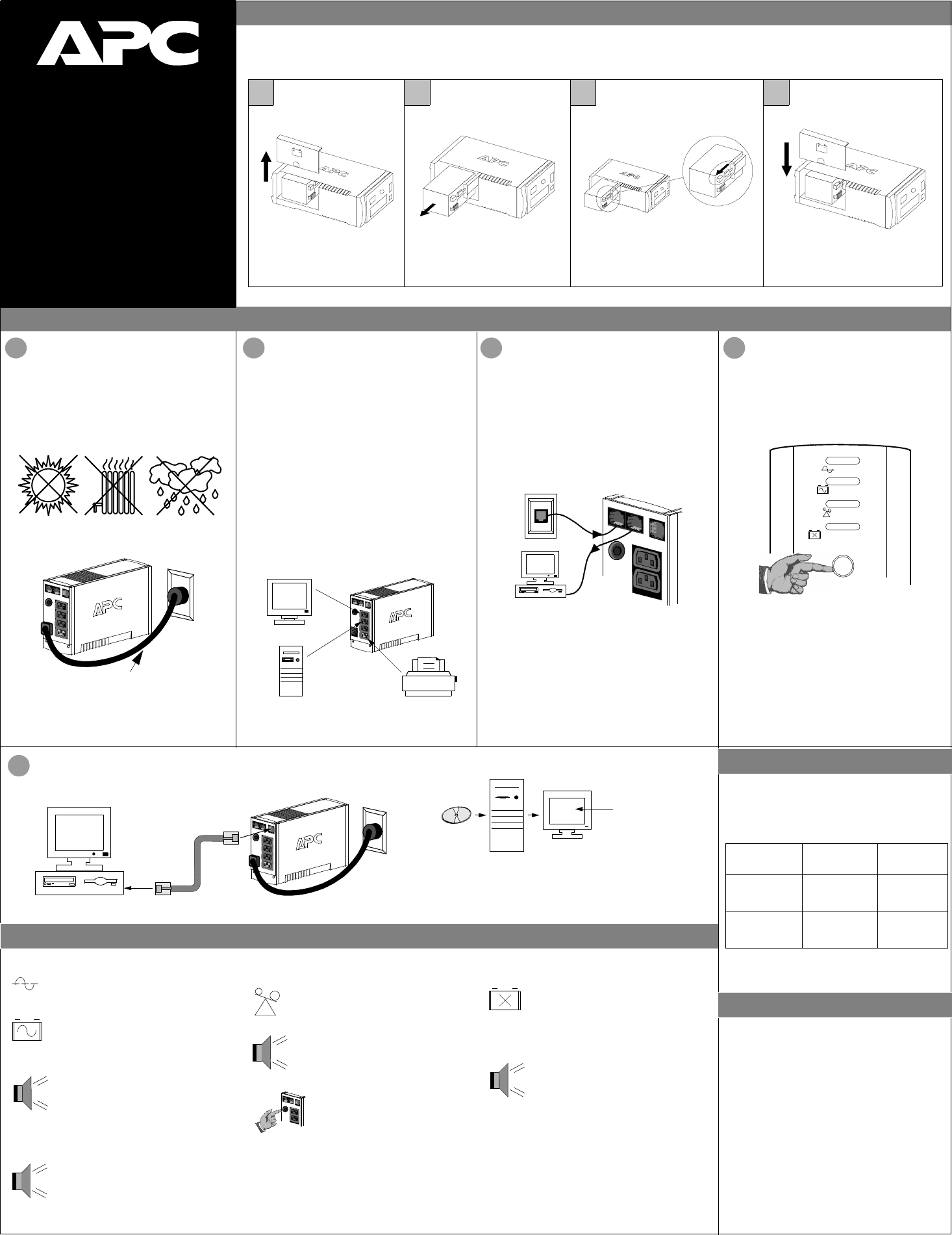
Connect the Internal Battery
The Back-UPS RS is shipped with one battery wire disconnected. To connect the internal battery, proceed as follows:
Note: Connecting the battery is a safe procedure. However, small sparks may occur during the process. This is normal.
21 3 4
Place the unit on its side. Slide
the battery compartment cover
upward and off of the UPS.
Pull the battery partially out of the
chassis, exposing the battery
terminals and wires.
Connect the black battery wire to the
terminals as Ground (-) terminal. Slide
the battery back into the chassis.
Align the battery compartment cover
with the grooves in the Back-UPS RS.
Slide the cover down until it locks.
Installation
Back-UPS
™
User’s Manual
990-9217A 1/04
RS 500
On Line (green) - is lit whenever utility
power is powering the Battery Backup
outlets.
Overload (red) - is lit whenever power
demand has exceeded the capacity of the
Back-UPS RS.
Continuous Tone - this alarm is sounded
whenever the Battery Backup Outlets are
overloaded.
Circuit Breaker - the circuit breaker
button located on the rear panel of the
Back-UPS RS will stick out if an
overload condition forces the Back-
UPS RS to disconnect itself from
utility power. If the button sticks out,
disconnect non-essential equipment.
Reset the circuit breaker by pushing
the button inward.
Replace Battery (red) - is lit whenever
the battery is near the end of its useful life,
or flash if the battery is not connected (see
above). A battery that is near the end of its
useful life has insufficient run-time and
should be replaced.
Chirps for 1 Minute Every 5 Hours - this
alarm is sounded whenever the battery has
failed the automatic diagnostic test.
On Battery (yellow) - is lit whenever
the battery of the Back-UPS RS is
powering equipment connected to the
Battery Backup Outlets.
Four Beeps Every 30 Seconds - this
alarm is sounded whenever the Back-UPS
is running On Battery. Consider saving
work in progress.
Continuous Beeping - this alarm is
sounded whenever a low battery condition
is reached. Battery run-time is very low.
Promptly save any work in progress and
exit all open applications. Shutdown the
operating system, computer and the Back-
UPS RS.
Status Indicators and Alarms
To Computer
USB Port
RJ-45/USB Cable
to Back-UPS RS
5
Connect USB Cable and Install Software (optional)
If Autoplay is not enabled on the computer, proceed as follows:
1. On the computer desktop of the display, double-click on My
Computer.
2. Double-click on the CD-ROM drive icon and follow the on-
screen instructions.
Follow the
on-screen
instructions.
Data Port
w
w
w
.apc.com
®
There are four status indicators (lights) on the front panel of the Back-UPS RS (On Line, On Battery, Overload, and Replace Battery).
Note: Allow the Back-UPS RS to charge a full eight
hours prior to use.
Press the push-button on the front panel of the Back-
UPS RS.
Observe that the following events occur after
pressing and releasing the push-button:
• The green On-Line indicator flashes.
• The yellow On Battery indicator lights while
the Self-Test is being performed.
•When Self-Test has successfully completed,
only the green On Line indicator will be lit.
• If the internal battery is not connected, (see Step
1 above) the green On Line indicator will light
and the red Replace Battery indicator will flash.
ON LINE
ON BATTERY
OVERLOAD
REPLACE BATTERY
4
Switch on the
Back-UPS RS
The rear panel of the Back-UPS RS consists of the
following elements:
Battery Back Up Outlets (qty. of 3). These outlets
provide battery back-up, surge protection, and Electro-
magnetic Interference (EMI) filtering. In case of
power outage, battery power is automatically provided
to these outlets. Power (utility or battery) is not
supplied to these outlets when the Back-UPS RS is
switched Off. Connect a computer, monitor, and
external disk or CD-ROM drive to these outlets.
Surge Only Outlet. This outlet is always On (when
utility power is available) and is not controlled by the
On/Off switch. This outlet does not provide power
during a power outage. Connect a printer, fax machine
or scanner to this outlet.
Avoid placing the Back-UPS RS in:
• Direct sunlight
• Excessive heat
• Excessive humidity or in contact with fluids of
any type
Plug the Back-UPS RS into a wall outlet, as shown.
• The Back-UPS RS charges the internal battery
any time it is connected to a wall outlet.
Your computer’s power cord.
The telephone ports provide lightning surge protection
for any device connected to the telephone line
(computer, modem, fax or telephone). The telephone
ports are compatible with Home Phoneline Networking
Alliance (HPNA) and Digital Suscriber Line (DSL)
standards, as well as all modem data rates. Connect as
shown.
Wall Outlet
Modem/Phone/Fax
1
Placement / Power
3
Connect Phone Lines
2
Connect Equipment
to the Back-UPS RS
to Surge Protection
Back-UPS RS Storage
Before storing, charge the Back-UPS RS for at least
eight hours. Store the Back-UPS RS covered and
upright in a cool, dry location. During storage,
recharge the battery in accordance with the following
table:
Please contact APC Online Technical Support to
troubleshoot the unit before returning it to APC.
Storage
Temperature
Recharge
Frenquency
Charging
Duration
-5 to 30
o
C
23 to 86
o
F
Every 6 months 8 Hours
30 to 45
o
C
86 to 113
o
F
Every 3 months 8 Hours
Order Replacement Battery
The typical battery lifetime is 3-6 years (depending on
the number of discharge cycles and operating
temperature). A replacement battery can be ordered
over the phone from APC, or the battery can be
ordered on-line from the APC web site (see below, a
valid credit card is required).
When ordering, please specify Battery Cartridge
RBC2.
